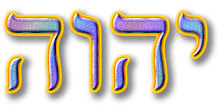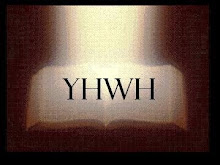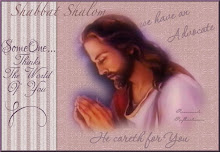Nissan/Aviv 16, 5769 Sixth Day Yom Ha'shee shee
If you are like me, you have a desire to know about the Word...understand it better and a desire to utilize its wisdom. This is from Hope for Israel and I find it full of truth and wisdom...it is up to us to ask our Abba for understanding.
May you be blessed abundantly!
Passover 5769
Passover is a very significant season. There are many aspects to understand and instructions to follow. In a technical sense, the word Passover refers to the lamb which was sacrificed on the 14th day of the month of Nissan (or Aviv). The Feast of Unleavened Bread is a seven day festival with the first day (the 15th of Nissan) and the seventh day (the 21st of Nissan) being holy days. What does this mean—a holy day? The bible calls these days Shabbats and they must be treated as a Sabbath day no matter on which day of the week they actually fall. If one studies Leviticus chapter 23 he will find a list of these festival days.
One of the things that HaShem instructs the Children of Israel to do during the Feast of Unleavened Bread is mentioned in Lev. 23:9-14. This involves the offering of the Reisheet offering. This word, Reisheet, means “first”. This offering begins a seven week period of harvesting the barley and wheat fields. It is significant that although no date is given for when to observe this offering, there is clear instruction on when to do it. The reader is told to make it on the day after the Sabbath. This is a cause for confusion among some. Today rabbinical Judaism says the Sabbath which is being referred to is the holy day Sabbath which occurs on the 15th of Nissan. Hence the observance of the Reisheet offering would also take place on the 16th of Nissan. If this is the proper interpretation, then why are we not told in the Torah to make it on the 16th?
There are those who correctly point out that in Lev. 23:15, one is instructed to count seven Shabbats from the day of the Reisheet offering and the next day (the fiftieth day) would be the festival of Shavuot or Pentecost. If the intent of the word Shabbat in verse 11 was the holy day (the first day of the festival of Unleavened Bread) there is a problem. There are not seven holy days in the fifty day period to which the Torah is speaking. Therefore the Torah is referring to the seventh day Shabbat in this passage. Although the actual calendar date can vary, the Reisheet offering and Shavuot / Pentecost must always occur on the first day of the week (Sunday).
One is told that when the Reisheet is brought to the Cohen (priest) he must wave it as a wave offering. What is actually waved is a loaf of unleavened bread. This wave offering signifies victory. The hope is that the rest of the harvest would be like the Reisheet.
The Apostle Paul, knowing these things, calls Yeshua our Reisheet in I Corinthians 15:20,
“But Messiah has risen from the dead, the first fruit (Reisheet) of all those who have fallen asleep in the dust, i.e. died.”
In the same way that the priest and the people prayed that the rest of the harvest would be like the first fruit, so does Paul teach that in the same way Yeshua rose from the dead in Victory so shall those who belong to Him,
“That just like that in Adam all died, thus also in Messiah all shall live. But everyone in his order: the first (Reisheet) is the Messiah, afterwards, when He comes, those who belong to Messiah.” I Cor. 15:22-23
Now let’s talk about how these dates and instructions concerning Passover and the festival of Unleavened Bread relate to Yeshua. In discussing the dates for the death and resurrection of Yeshua there is something important to remember. This is the two types of Shabbats that we have already discussed. In regard to the Biblical account of Messiah’s death and resurrection and learning on what day of the week these two things occurred and what were the dates, the key clue is the spices that the women bought and prepared for the purpose of anointing the body of Yeshua; even though Nicodemus and Joseph of Arimathaea (biblical Ramah) had done so earlier. It is like when a man washes the dishes and his wife thinks she has to rewash them.
In regard to the spices one needs to study Luke 23:50-56. Note that in verse 56 that the women prepared the spices but then rested on Shabbat according to the commandment. When did they prepare the spices—before Shabbat? But in Mark 16:1-2, the reader is told that they buy the spices after the Sabbath. How can this be? The answer is simple; Mark is speaking about the Sabbath of the Holy day itself, the 15th of Nissan; while Luke is speaking of the normal 7th day Sabbath, i.e. Saturday. We are told both by Luke and John that Yeshua died on preparation day—the 14th of Nissan. This is the day that the lambs were sacrificed. Hence Yeshua died on the cross at approximately 3:00 pm. Then the soldiers came and broke the legs of the other two because of the concern that bodies would be on the crosses for the Holy Day.
Joseph then came before Pilate and requested Yeshua’s body so that he could bury Him. We are told it is almost sundown on the 14th when Yeshua is placed in the tomb. Since with sundown on the 14th begins the new day, the 15th of Nissan, the holy day of the first day of Unleavened Bread would begin—a holy day Shabbat. Hence it was after the 15th, i.e., on the 16th that the women bought and prepared the spices, but did not have enough time to get to the tomb before the 7th Day Shabbat began, i.e. Friday night. Hence they rested on the Shabbat (Friday evening to Sundown on Saturday). They had agreed to meet at the town on the first day of the week very early.
Therefore we now know the date for Yeshua’s crucifixion, the 14th day of Nissan. This had to be that year on a Wednesday. Therefore He was placed in the tomb at almost sundown on Wednesday. Thursday was a holy Day, i.e., high Sabbath (the 15th of Nissan). Friday, the 16th of Nissan, the ladies bought and prepared spices. Shabbat the 17th of Nissan they rested and Sunday (Saturday night), the 18th of Nissan Yeshua resurrected from the dead. In the morning of the 18th the women came to the tomb and it was empty announcing His resurrection. This coincides with the 3 days and 3 nights and the scripture says that Yeshua had to be in the tomb,
“Just as Jonah was in the belly of the fish three days and three nights, so too will the Son of Man be in the heart of the earth three days and three nights.” Matthew 12:40
If one has any doubt that Yeshua was crucified on the 14th of Nissan and this was the afternoon before the Holy day (first day of Unleavened Bread) please see John 19:31, which clearly states the Shabbat that they were concerned with was not a 7th day Shabbat, but a High Sabbath or Festival Sabbath.
Happy Passover and Shabbat Shalom
Subscribe to:
Post Comments (Atom)











No comments:
Post a Comment